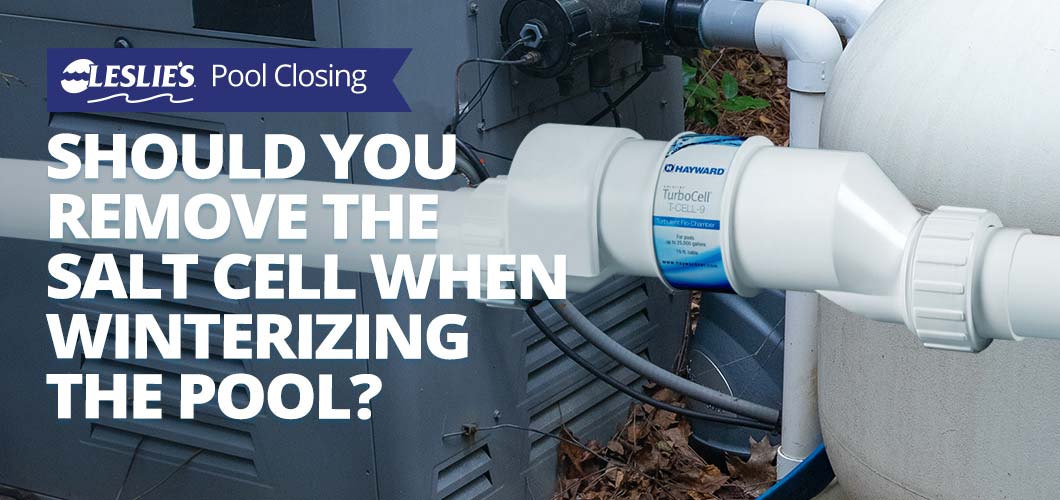
Should You Remove the Salt Cell When Winterizing the Pool?
While winterizing a saltwater swimming pool, you'll need to take care to make sure it's fully prepared for the long, cold months ahead. As with any pool, there is a standard chain of events involved in the pool closing process, which will help your pool emerge without any unwelcome surprises — such as freeze damage or algae — next spring. But for pool owners with a saltwater pool, there's one extra winterizing step to protect your pool investment — protecting your salt cell for winter.
Pool owners routinely ask us questions about correctly winterizing or closing their pools. Recently, questions about what to do with salt cells have been trending. Many pool owners ask us, “What in the world do I do with my salt cell during the winter?” The answer is: it depends where you live.
Salt Cells Can't Work in Cold Winter Temperatures

Your salt cell is a pretty smart piece of equipment! When the temperature gets below 50–60ºF or so, your salt cell will most likely shut itself off automatically. This is because the ability of the cell to produce chlorine through electrolysis drastically decreases the lower the water temperature gets. As temperatures continue to drop, the cell has to work harder to produce the required amount of chlorine. The automatic shut-off feature can help prolong the life of the cell and protect your salt system investment.
Chlorine Requirements Go Down During Winter
During the winter months, the amount of chlorine needed to keep a pool clean goes down substantially. This is largely due to the fact that bacteria and algae can't flourish in cooler temperatures. For algae, the magic temperature for growth is around 65ºF, and for bacteria, the number is a bit lower. Your salt system can't function at these temperatures anyway, so you'll need to use an alternative means of sanitization (such as a floating chlorine dispenser with tablets and routine pool shock applications) once the temperatures start dropping. Since you won't be using the salt cell during cold weather, this leads us to our next point...
Should You Remove the Salt Cell for Winter?
You may be thinking it's okay to keep the salt cell connected to the plumbing lines through the cold off-season months. And depending on your location, this might be true. However, if there's any risk of freezing weather, it's strongly recommended to uninstall it until spring. In fact, salt system manufacturers often advise you to remove, clean, and store the unit indoors through the winter to prolong the life of the cell and avoid any risk of freeze damage. Even pool owners who live in warmer climates may opt to bring the salt cell inside when winter temperatures are consistently below 60–65ºF.
PRO TIP: Looking for tips and tricks on closing your pool? Head over to our blog to check out numerous articles on how to properly winterize a swimming pool. Saltwater pools aren't really all that different from other pools when it's time to close. The biggest difference is determining what to do with your salt cell.
Some manufacturers offer a "dummy cell" winter accessory, which fits in place of your existing salt cell. A dummy cell is a mock salt cell, which is basically a non-functioning hollow spacer that takes the place of your existing salt cell for the winter. Dummy cells serve a couple different purposes. They keep the plumbing system closed off in a complete loop, allowing you to either continue running the pump (for non-closed or partially closed pools) or keep your winterized plumbing sealed and protected (for fully closed pools). Even for fully closed pools that don't need to use their pool equipment over the winter, putting a dummy cell in place can prevent minor plumbing shifts during the seasonal freeze and thaw cycle, which may make it more difficult to place the working cell back in line next season.

Suspecting Winter Damage to Your Salt Cell?
If you leave your salt cell in for the winter and start noticing low chlorine levels within your pool once the pool is reopened, the first thing to do is check your salt cell for damage. During the harsh winter months, water expands as it freezes. If there was any water in your salt cell at the time, this can ultimately damage the housing surrounding the cell, or it can shift and damage the electrode plates. Although electrode plates can be replaced, it will usually cost about as much as buying a whole new salt cell for your system. The best way to fix this is to prevent it from happening in the first place by removing your salt cell while you work to winterize the pool.
Got Questions? Leslie's Has Answers.
If you need help winterizing your saltwater pool, the experts at Leslie's are here to help. From the testing and cleaning, to the water prep and final winterization steps, we're here for you every step of the way. If you're the DIY type, you can download our FREE Leslie's Pool Closing Guide to guide you through the winterizing process. Our handy Pool Closing Kits help take the guesswork out of closing the pool, providing all the winterizing chemicals you need. If you're not comfortable with some of the bigger closing tasks, such as winterizing the plumbing/equipment and covering the pool, schedule an appointment with a Leslie's service technician, and we'll do all the hard work for you. For more information, or to get your toughest winter pool care questions answered, call or stop by your local Leslie's today.